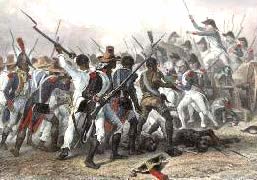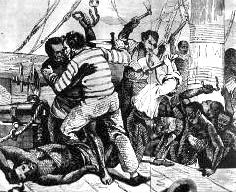Pain and Anger Demand Communist Revolutionary Transformation, Not a Cash Payout

In the Haitian revolution (1791-1803), enslaved people successfully fought to abolish slavery and took power in a former French colony. Later, French gunships imposed “compensation” payments, impoverishing the Haitian masses. The next Haitian revolution must be for communism.
June 30— “Enough is enough!” Millions worldwide have taken to the streets in the past month in big cities and tiny villages, on every continent.
This mass response to the police murder of George Floyd, in broad daylight amidst a pandemic and an economic collapse, has created an historic moment. The pandemic exposed the vulnerability of the most oppressed and most essential workers. Floyd’s murder exposed the racist police terror that maintains the system of oppression and exploitation.
And the mass response has exposed the vulnerability of the capitalist bosses. Fifty-five percent of all young Americans, and a whole lot of older folks of all “races,” have marched. They faced rubber bullets, police batons, and tear gas in ninety-nine US cities—and kept marching.
The police are trained to respond violently to all workers but especially to Black, Indigenous and Latino young men. So the murders continue — and so do the protests.
A recent survey revealed that Black youth see revolution as a more plausible strategy for social change than voting. And protesters of all ages and “races” have welcomed communist ideas and this newspaper.
The ruling class sees and fears the potential for revolution in the current situation. That’s why they are pushing a cafeteria of reforms. The capitalists are renaming buildings and pancake syrup. They are promoting Black-owned businesses and whites-only “consciousness-raising” book clubs.
Cities and school districts are voting to distance themselves from police agencies. They are planning more palatable forms of social control. “Get out the vote” campaigns have new talking points.
And the bosses’ media are now promoting reparations for African Americans.
Reparations: the appearance of justice but the reality of continuing racist exploitation
Reparations may cost the rulers some cash – cash they stole from the working class. But the US bosses are now scared enough to consider this as a lesser evil.
House Bill #40, calling for a study of reparations, has been stalled in Congress since 1989. But this spring the New York Times, Forbes, Brookings and The Atlantic have fast-tracked proposals calling for increased taxes on the richest Americans to finance cash payments to Black American descendants of enslaved people.
The ruling class is desperately trying to buy time, to stifle the mass uprising against racist capitalism. They hope to divert a potentially revolutionary movement into a campaign for social services and social control. For subsidies for Black capitalists and chump change for Black working-class families.
Capitalism is based on racist violence from start to finish. The genocide of Native Americans and the kidnapping and torture of Africans were the foundation of US capitalism in particular and capitalism in general.
Black workers have played a crucial role in the accumulation of capitalist wealth. Murderous police power developed to suppress the fight-back of Black Americans excluded from the fruits of their labor by centuries of slavery, legal discrimination, imprisonment, racist exploitation, and violence.
Racist terror and lies have kept the working class divided. They have allowed the capitalist class to continue in power even as it becomes increasingly obvious that its system is dying.
No cash payment can compensate for the life of a loved one, or for slavery’s kidnappings and family separation. The pain and anger of slavery and racism demand revolutionary transformation, not a cash payout.
Reparations won’t change the nature of capitalism. Its twin pillars are exploitation and inequality. It can’t be reformed. It must be overthrown.
We must destroy the divisions of racism, sexism, xenophobia, Islamophobia and homophobia that have kept the working class subject to the demands of capital. We must mobilize the masses, especially industrial workers and soldiers, into a revolutionary army that can take power away from our long-time oppressors.
And when we take power, we must dismantle all the systems of oppression. We fight for communism and nothing less. We will abolish the oppressive capitalist state with its cops and courts and prisons and jails. We will abolish the institutions that have perpetuated racist ideas, the bosses’ media and their schools.
But more: We will abolish the economic base of our oppression. That includes the private ownership of the wealth we have collectively produced, the banks and stock options, wage-slavery and money itself. We will seize the fields and the factories and the mines, the weapons and the hospitals and the infrastructure of transportation and communication that the working class has built. We will use it to meet the needs of the masses.
We will finally be able to work together for the good of all. We’ll finally repair the damage that has been done by racist capitalism. Society will have its basis in the communist principle, “from each according to commitment, to each according to need.”
Communist society will make real reparations for the racist attacks of capitalism. It will give wings to the resilience and dedication that racism has taught the Black working class.
Reparations: Long-Time Talking-Points of Bourgeois Nationalism
Bourgeois nationalists worldwide have demanded reparations for colonialism, apartheid, and slavery for decades.
One starting-point is the Marxist-Leninist and pan-Africanist revolutionary Thomas Sankara. He was President of Burkina Faso from 1983 until his assassination in 1987.
Sankara urged other African leaders to cancel their countries’ foreign debts. “Debt’s origins come from colonialism’s origins,” he declared. “We cannot repay but the others owe us what the greatest wealth could never repay, that is blood debt.”
Sankara influenced the “Black consciousness” movement in South Africa.
In 2003, the South African government said it would make token reparations for Apartheid. These went only to about 19,000 individuals who testified before the Truth and Reconciliation Commission. Today, Julius Malema’s Economic Freedom Fighters have transformed the demand for reparations for apartheid. They demand the nationalization of all rural land without compensation.
Indian politician Shashi Tharoor has built a popular following by demanding that the British government pay the Indian government symbolic reparations for colonialism. These would amount to just one pound sterling per year for two hundred years.
Groups with similar demands exist in Haiti and the former British colonies of the Caribbean.
Groups in Brazil, the destination of the largest number of people kidnapped from Africa during the Transatlantic Slave Trade, also call for reparations.
All of these groups accept capitalism as the framework for reparations. None address the “blood debt” of centuries of racist exploitation. We ask readers to help produce articles that deal with these currents in more depth.

German Coast rebellion, 1811, the largest slave rebellion in US history. Five hundred enslaved people, led by 22-year-old Charles DesLondes (formerly enslaved in Haiti) marched on New Orleans with arms and banners and fought hard until the end.

